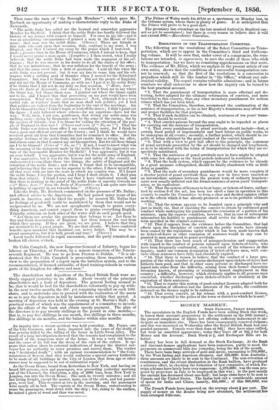RESOLUTIONS OF THE ThatESPORUTION .COMEHTFEE.
The following are the resolutions of the 6elect Committee on Trans- portation, which are to appear in the Committee's third and forthcom- mg volume. It will be seen that, under cover of a compromise, the reso- lutions are intended, in appearance, to save the credit of those who stick to transportation : but we have no remaining apprehensions on that score. The evidence of Mr. Elliot, which we analyze in thearticle of our own series, shows that the conditions of a sue transportation can- not be renewed; so that the first of the resolutions is a concession to prejudices which still lie like lumber in "the Office," without any sub- stantial validity. The sequel contains valuable admissions ; and in future numbers we shall endeavour to show how the inquiry can he turned to the best practical account.
"1. That the punishment of transportation is more effectual and de- terring, better adapted for the ultimate reformation of convicts, and more beneficial to this country, than any other secondary punishment for serious crimes which has yet been tried. " 2. That the Committee, therefore, recommend the continuation of the sentence of transportation, so far as her Majesty's dominions may afford safe and proper facilities for that purpose. " 3. That if such facilities can be obtained, sentences of ten years' trans- portation should be revived. "4. That convict-prisons beyond 'the seas ought to be regarded as places for carrying out the sentence of transportation. "5. That every punishment by penal servitude should include—flrst, a certain fixed period of imprisonment and hard labour on public works, to be undergone at all events ; secondly, a further period, which should be ca- pable of being abridged by the good conduct of the convict himself. " 6. That with a view to give full effect to this principle, the sentences of penal servitude prescribed by the act should be changed and lengthened, so as to be identical with the terms of transportation for which they are re- spectively substituted. " 7. That the sentences of penal servitude now in force might be adopted with some few changes as the fixed periods indicated in resolution 5. " 8. That the hulk system, which appears by the evidence to be already in a great measure relinquished, should be finally abandoned with as little dell as possible.
. That the scale of secondary punishment would be more complete if a shorter period of penal servitude than any now in force were enacted as an intermediate sentence between the present term of ordinary imprison- ment now usually inflicted and the former sentence of seven years' transport- ation' or its equivalent.
" 10. That the system of licences to be at large, or tickets-of-leave, author- ized by section 9 of the act, has been too short a time in operation in this country to enable the Committee to form a clear and decided opinion either as to the effects which it has already produced or as to its probable ultimate working. " 11. That the system appears to be founded upon a principle wise and just in itself, viz. that of enabling the convict to obtain by continued good conduct while undergoing his punishment the remission of a portion of his sentence upon the express condition, however, that in case of subsequent misconduct his liability to punishment shall revive for the residue of the term specified in the original sentence. " 12. That it appears from the evidence before the Committee, that bad. effects upon the discipline of convicts on the public works have already been caused by the regulations under which it has been made known that no ticket-of-leave or other remission of sentence would in any case be granted to men sentenced to penal servitude. " 13. That there has been much of misapprehension and exaggeration with regard to the conduct of persons released upon tickets-of-leave, who i have been frequently confounded, even by several of the witnesses in this inquiry, under one common designation of ticket-of-leave men, with con- victs whose sentences have fully and absolutely expired. " 14. That there is reason to believe that the conduct of a large pro- portion of the whale number of persons discharged upon tickets-of-leave had hitherto been good, and that in other cases persons so discharged have re- lapsed into crime from the difficulty, arising from their former characters becoming known, of procuring or retaining honest employment in this country ; a difficulty, however, which obviously applies to all persons once convicted, whether discharged upon tickets-of-leave or absolutely at the expiration of their sentences. "15. That to render this system of good-conduct licences adapted both for the reformation of offenders and the interests of the public, the conditions indorsed on the licence ought to be enforced. "16. That every convict, on his release with a good-conduct licence, ought to be reported to the police of the town or district to which he is sent."'


































 Previous page
Previous page